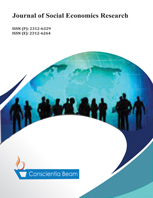Does Nigeria’s underdeveloped financial sector harm non-crude oil export trade? Empirical evidence from linear and non-linear models
DOI:
https://doi.org/10.18488/35.v11i3.3831Abstract
The purpose of this study is to determine the effect of financial sector development on Nigeria’s non-crude oil export trade. For this reason, we employ a battery of econometric models and tools, including the Autoregressive Distributed Lag model and the sequentially determined threshold model. The study found that financial sector development and export of non-crude oil merchandise are unrelated in the long term, which challenges theoretical view that financial sector development and trade are linked at any time. The study further showed that, in the short term, the country's level of financial sector development, though shallow and seeming underdeveloped, is able to support exports of non-crude oil products. This finding challenges theoretical view that lower levels of financial sector development could hinder non-crude oil export trade flows. The study, however, found a threshold effect showing a minimum level of financial sector development that promotes non-crude oil export trade, which indicates that the relationship between financial sector development and non-crude oil export is non-linear, which contradicts the theoretical view. The study recommends that Nigerian policymakers and the government adhere strictly to the minimum level of financial sector development; otherwise, non-crude oil export trade may worsen.

